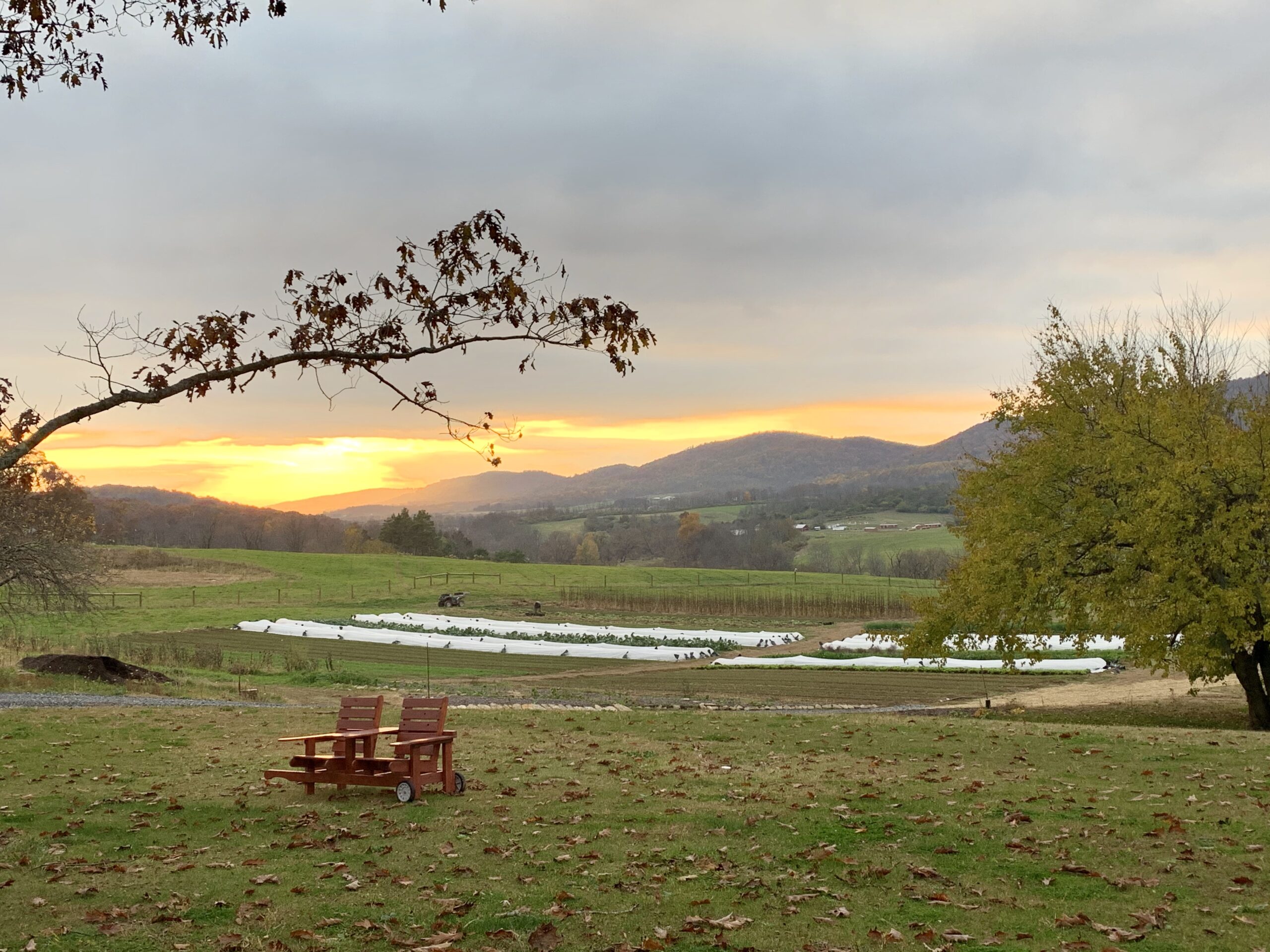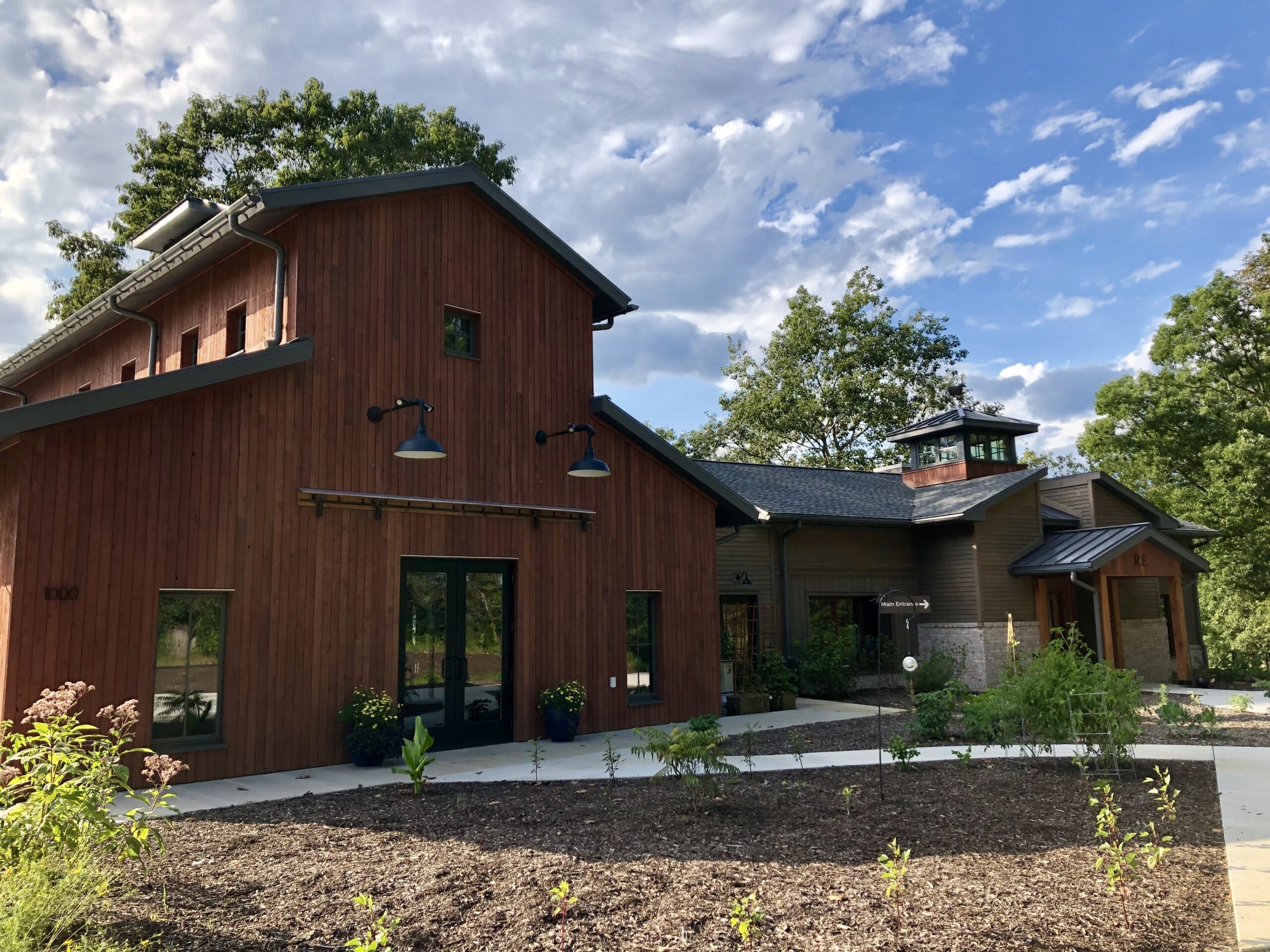RE Farm Café is a farm-to-fork eatery, built on a working regenerative farm, committed to supporting local agriculture and modeling responsible sourcing for food, energy, and water while serving the community through educational outreach and reinforcing human connections around food and the environment. The project seeks to be a catalyst for change in the regional fooding system and beyond while serving as a teaching tool and source of inspiration through its high aspirations of net zero water and energy performance and responsibly sourced and repurposed materials in a natural and beautiful setting. Located 10 minutes from Penn State University and Bellefonte, it is a convenient and remarkable place for learners of all ages to come together around food and its relationship with healthy people and ecosystems in the region.
Vital Stats
| Certification Status | Petal – Water, Equity, Beauty |
| Version of LBC | 2.1 |
| Location | State College, PA |
| Project Area | 5672 square feet |
| Start of Occupancy | July 2019 |
| Number of Occupants | 32 |
Project Team
| Owner | Duke and Monica Gastiger |
| General Contractor | Envinity |
| Architect | 7group |
| MEP Engineer | Envinity |
| Civil Engineer | Penn Terra Engineering |
| Landscape Architect | Weber Murphy Fox |
| Certification Consultant | 7group |
Early Design Process
How was the team assembled? When was ILFI’s certification first discussed? Who was the first team member to bring up the possibility of certification? How did the team arrive at the decision to pursue certification? How was the decision communicated to all team members?

Initially, innovators Duke and Monica Gastiger contacted Alex Wilson, founder and executive editor of Environmental Building News, who connected them with the 7group. Members of the 7group shared their expertise and embraced the Gastiger’s vision for an innovative farm to table restaurant on a working farm that showcased green building. The Gastiger’s first design was an off-the-grid establishment. Once their enthusiasm was redirected to better understand building practices that aligned with their ambitions, Marcus Sheffer and John Boecker, 7Group innovators, introduced the Living Building Challenge. The Gastigers knew they found a kindred spirit.
An initial invitation to community members from high school to retired business leaders was extended to be co-creators in helping generate ideas and plan the dream. That workshop of collective ideas helped shape the project and respond to community needs. The Gastigers toured and attended a biophilia workshop at the Phipps Conservatory. Inspired by this visit and connecting with other dreamers, the Gastigers found additional investors to become co- creators in the LLC. The LLC embarked on the journey towards LBC certification.
A second community charette was focused on design components, followed by multiple continued meetings engaging new acquaintances with aligned values and skills that would help propel the project forward. After becoming acquainted with LBC certification needs, the Gastigers and 7group help organize workshops for local construction/industry businesses to learn about the requirements and process. The LLC made a commitment to pursue LBC certification. Contracting a business that specialized in materials education, the LLC hosted a day long workshop for the project contractors and others.
That educational offering had a ripple effect, broadening community awareness at the design/construction level. RE Farm Cafe, LLC initiated an educational mission to share information about petal requirements and why this was needed in the area. The Living Building Challenge was new to many in the community and from the initial decision to pursue LBC certification to the present, the Gastigers continue to educate their community at every opportunity.

Occupancy
What surprises or issues did the project encounter during the project’s performance period? Did occupants use the building in unexpected ways that impacted performance? How did the team overcome these challenges? How will the lessons learned from occupant behavior influence future projects?
Initially, RE Farm Cafe was projected to be open March through December for dinner Wednesday through Saturday. Once open, public response quickly taught the Gastigers that the cafe should remain open year round.
The demand for meeting spaces, events such as weddings, showers, and retreats grew as word spread. Energy use was modeled around a limited schedule that needed to be expanded to meet consumer demand. Using the building year round and opening sometimes 7 days a week to support programming exceeded the projected energy needs. Upon opening, one solar array was installed on the barn roof not within the LBC boundary. With several months of energy production and use data, it became evident that additional capacity was necessary. Options were discussed; additional barn solar panels, cafe roof mounting, and ground mount. Because of the orientation on the barn roof, there was too much lost efficiency, the cafe roof mounting was no longer feasible due to adjusted national code for panel setback, and the ground mount was the only option.
The new ground mount solar array was positioned just outside of the cafe allowing guests an educational visual display. The construction crew hit rock while digging the ground mount pilings incurring additional costs and the original conduit was not sized for an addition. The back lawn was dug up to lay new conduit and there were challenges with ground restoration for the upcoming wedding season. A problem arose with the delayed delivery of the inverters, switching to Tesla inverters that were available immediately. Shortly after installation and commissioning by the net metering power company, 3 of the 4 inverters failed. Tesla replaced those units at no cost to the LLC, however, 7 months after the first failure, each new inverter failed, one at a time over several months. Providing the required net zero energy production data for the 12 month uninterrupted audit period has been problematic. This addition, while welcome, was a financial hardship. RE Farm Cafe opened in 2019 and faced COVID closures and adaptations in March 2020. With the increased financial weight, funding an additional solar array was challenging. RE Farm Cafe needs to be financially viable and the increased use combined with unexpected financial strain has been a balancing act.


